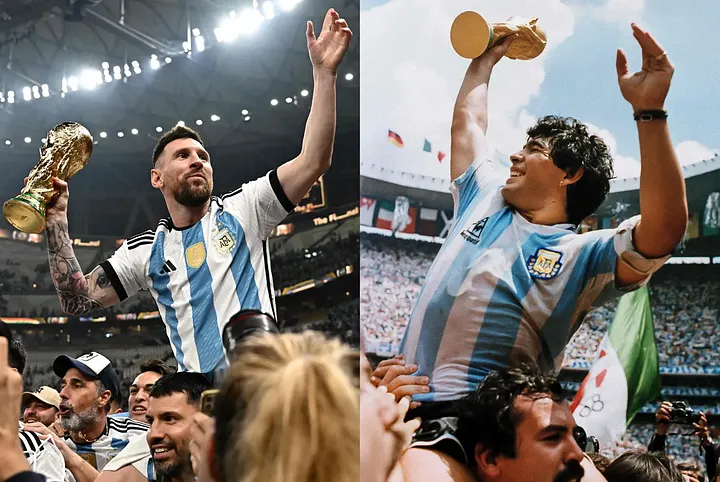Argentina’s Messiah: Crowned as the game’s greatest-ever player in its greatest-ever match
December 26, 2022
Reflections on Lionel Messi’s legacy, one week on from the most important day of his career
Originally published on Medium.com
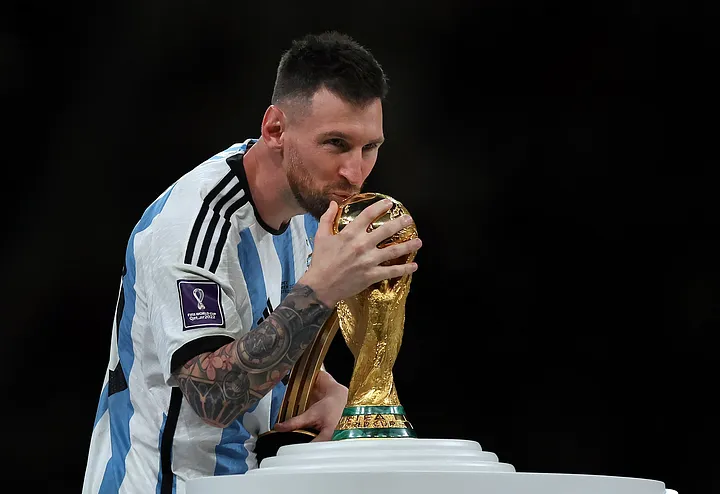
No matter the outcome, it was clear that the final of the 2022 FIFA World Cup was going to deliver a thrilling contest and make for one of the most remarkable occasions in the long, storied history of the international game.
It was the first time since 1998 that the reigning champions had reached the final, and France had the opportunity to accomplish that which they prevented 24 years ago: to become the first team to repeat as back-to-back World Champions since Brazil did so in 1958 and 1962. Kylian Mbappé, whose devastating Champions League performances had seen his claim as the world’s best player crescendo to an almost undeniable fever pitch in the four-and-a-half years since his World Cup debut in Russia, could continue in the footsteps of the legendary Pelé and quash the ultimate dream of his PSG teammate and GOAT contender Lionel Messi, on his path to cementing his own legacy as one of the game’s all-time great players.
And while that was an enticing scenario, the opposite was positively mouthwatering. Lionel Messi, a player who had been world class for at least 16 years and given the game so much, had the opportunity to win the trophy that had eluded him on four previous occasions. It was his last chance to win the most important trophy the game had to offer, and adorn his illustrious set of silverware with a golden crown. Already considered by many to be the greatest footballer to ever step onto a pitch, it would dash any asterisk placed next to his name and remove the blemish on his otherwise spotless sporting legacy.
And that was merely the background. On the pitch, the stars of both sides had been shining throughout the tournament. Both Messi and Mbappé entered the final on five goals apiece. Supporting stars Olivier Giroud and Julián Álvarez each trailed closely behind on four goals, and with all four starting in the final, the Golden Boot race was wide open. Mbappé had already bested his tally of four goals in Russia, and Messi had scored in the knockout stages of a World Cup for the first time by scoring against Australia in the Round of 16. He promptly demonstrated that this was no fluke by scoring in the quarterfinal vs. the Netherlands and the semifinal vs. Croatia as well.
The stage for the clash of the two kings and their armies was set.
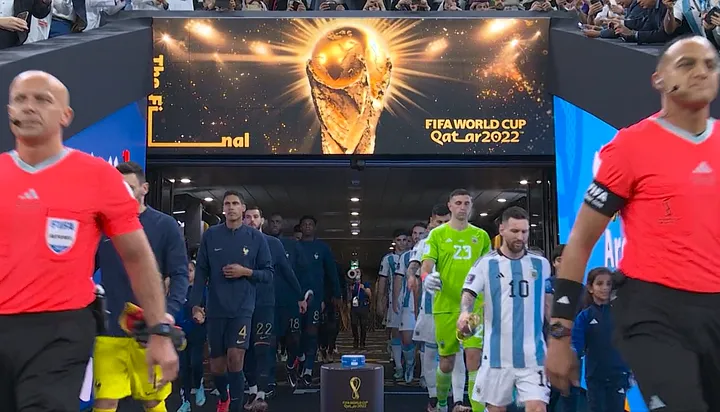
The game
Argentina dominated the early stages of the game, as the sluggish French side struggled to make their mark. Ángel Di María, Messi’s fellow Rosarino and elder statesman, whose selection in the starting lineup puzzled many, proved to be the difference maker. His dynamism on the left flank confounded Jules Koundé and Ousmane Dembélé, whose clumsy and haphazard defending led to the Argentinian penalty that Messi scored to break the deadlock. La Albiceleste piled on the pressure from there. The second goal soon followed: a beautiful team goal of one- and two-touch football deftly finished by Di María at full sprint. The Argentines saw out the first half, comfortably in the lead, and with the French posing little in the way of a challenge, one could have been forgiven for thinking that an Argentine victory was a foregone conclusion.
Deschamps’ brave substitutions gave the French a foothold in the game early in the second half, but Les Bleus still weren’t probing in any meaningful way. It wasn’t until about the 70-minute mark that the game turned. After a seemingly exhausted Di María exited the game, Argentina quickly became sloppy. Their passing, especially their delivery into the box from wide areas, became increasingly errant, as Acuña and Molina struggled to provide adequate service. Messi’s presence in the game faded, and the French grew in confidence. French substitute Kolo Muani was brought down by Otamendi in the box in the 79th minute, and Mbappé seized his moment. He coolly dispatched the penalty into the bottom corner of the net; his only reaction was to storm towards goal and beat the famously cheeky Emi Martínez to the ball to enable his side to make the quick restart.
Suddenly, the Albiceleste fairytale ending was in jeopardy, and clouds gathered to rain on Messi’s sky blue parade. In this position, with about a quarter hour of regulation and injury time to go, it was vital for Argentina to regain control of the game and dictate its tempo once again. But it wasn’t to be. Less than two minutes later, the French struck again. It was Messi, of all players, who had his pocket picked. He watched on after being dispossessed by Kingsley Coman as the French drove towards goal with singular determination. Mbappé, clearly emboldened by his first goal and riding the momentum the French had gained, created a chance for himself by setting up a stunning one-two with Marcus Thuram and skilfully volleying the lofted return pass into the far bottom corner, past a flailing Martinez, from one step inside the box. It was stupefying. Not only had France drawn level, but with at least ten minutes left to play, they looked well capable of scoring again and breaking Argentine hearts on their way to a repeat World Cup triumph within regulation time.
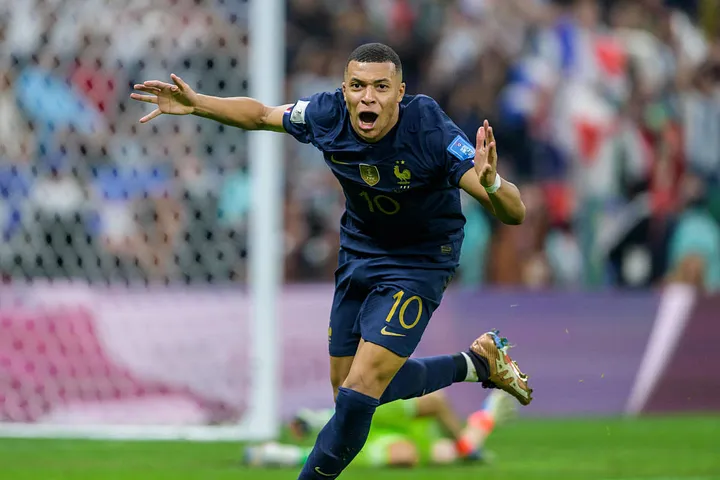
The would-be headlines and discussions began to appear. The Argentine victory in the desert was a mirage, an illusion. The oasis to which Messi had been prophesied to lead them, to quench a thirst for World Cup glory 36 years in the making, had turned to sand in their mouths. Not only would Messi lose his second World Cup final and the sixth final of his international career, but he would lose yet another in heartbreaking fashion. In what would be a cruel juxtaposition, his side would fall apart and he would fail to rise to the occasion as Mbappé grabbed the game by the scruff of the neck and decided it for himself. It would be the nail in the coffin of his case the greatest player of all time; the narrative was to be that, ultimately, when it mattered most, he was not a big game player, and was by and large incapable of delivering on the game’s biggest stage.
Fortunately for all Argentines, most neutrals, and the millions of football lovers and admirers of the little genius intently watching on, that was not to be the end of the story; Argentina saw out the cagey remainder of the game successfully. Messi had the last real chance of the game, and sent a piledriving shot flying high towards the center of the net. Hugo Lloris was quick to react, and punched the ball over the bar. Had he placed the shot a couple of yards in either direction, Argentina would certainly have won the game then and there.
Extra time is a grueling war of attrition. As usual, the quality of play dropped, with little in the way of free-flowing, passing football. Players playing in the game of their lives and pushed well beyond their physical limits started to cramp, buckle, and give out. The game had reached the inevitable point in any heated contest where composure and tactics were transcended by spirit and determination. Early in the second half of extra time, in what was one of the few flowing passages of play in that stage of the game, Messi bundled a rebound from a shot by Lautaro Martínez over the line. Though it was cleared from inside the goal by Koundé, it was apparent that it had crossed the line. Messi threw his hand up in the air and ran towards the Argentine fans to celebrate without a moment’s hesitation. Even some of his teammates, whose faith in, dedication and even deference to their leader bordered on quasi-religious, paused to receive verification of the goal from the referee. Messi, however, didn’t even consider the possibility that he would be robbed of his moment. He had just scored the winning goal from open play for his country in a World Cup final. Or so he thought.
While the goal stood, the Argentine lead did not. A mere six minutes later, a curling effort by Mbappé, that may well have been destined for the top corner, struck the elbow of Gonzalo Montiel in the penalty box. Mbappé, seemingly unfazed by the enormity of the occasion, scored his second penalty and third goal in the game overall to level the game minutes before the end of extra time. Even then, when things seemed destined for penalties, there was more drama to be had. In the final seconds of the final minute of injury time in the second half of extra time, a misjudged ball by Nicolás Otamendi left Randal Kolo Muani clear on goal, one-on-one with Emi Martínez. The French forward struck the ball sweetly on the half-volley, and it barrelled towards the near post bottom corner. Martínez stood his ground and spread himself in front of the penalty spot. With his foot, he managed to block the shot, and save his country’s hopes of World Cup glory. Argentina countered immediately, and Lautaro Martínez failed to convert a glorious opportunity by mistiming his header on the edge of the six-yard box.
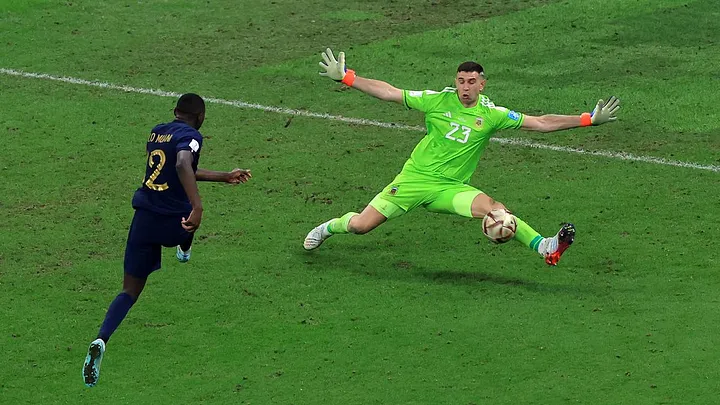
In the end, Argentina were victorious on penalties. Messi and Mbappé both converted, as did the other Argentine takers and France’s Kolo Muani. Kingsley Coman’s penalty was saved, and Aurélien Tchouaméni dragged his shot narrowly wide of the net. Gonzalo Montiel, whose handball had given France the penalty that led to Mbappé’s hat trick goal, scored the decisive penalty to win the World Cup for Argentina. Messi, elated and overcome with emotion, fell to his knees on the halfway line. He was mobbed by the majority of his teammates, who sought him out as though they were following a compass. What followed were several minutes of euphoria and tears of joy, as the wider context of what the world had just witnessed started to take shape.
The first realization was that this was undoubtedly the greatest World Cup final in living memory. Even in a vacuum, ignoring the decades-old sagas and stories of which this game was now and forever to be a part, it was thrilling. It was back and forth, end to end, a triumph for sport and for competition in general. It was a beautiful example of what football could be, and its power to captivate, entertain, unite, and transform. Every facet of the game delivered: the goals, the celebrations, the level of play, even the officiating. Never before has a World Cup final been so deserving of the biggest stage and audience that the sport has to offer. However, I believe that it would be a shame not to contextualize the impact this game has already had and will have on the history of football. Those stories, those discussions, are an indelible part of what make these moments so legendary. It is what this game means for those involved in it, and how it affects the pantheon of players to have graced the game, that elevates it from being a thrilling, pulse-pounding, breathtaking contest, to being, without exaggeration, the greatest football match ever played.
The debate is over
Despite their individual greatness and respectively colossal achievements in football, Lionel Messi and Cristiano Ronaldo may be destined to always be mentioned in the same breath, even long after both of their active playing careers are over. Many football fans and pundits condemn these comparisons and those who continue to push the conversation year after year, but there is good reason that the debate has raged on for over a decade now. The likes of players like Robert Lewandowski, Karim Benzema, Luis Suárez, Luka Modrić, and Sergio Ramos, all serial winners and titans of the game, show us that the current generation of footballers is as rich as any other in history. This makes it all the more impressive that Messi and Ronaldo stand head and shoulders clear of any of their contemporaries. While their decade-long duopoly on football’s biggest individual prizes is officially over now that they are firmly in the twilight of their careers, and players with whom they have shared the stage now occasionally upstage and outperform them over the course of an individual season, their longevity and continued impact and output put their legacies well out of reach.
Ronaldo and Messi both established themselves as world-class players in the 2006–07 season, and finished second and third respectively behind Kaká in Ballon d’Or voting at the end of the year. The following season, a rampaging Ronaldo nearly doubled his goal output and led Manchester United to a third Champions League title in Moscow. By an overwhelming margin over his budding rival, he was crowned as the world’s best player for the first time. The Portuguese would have to wait nearly half a decade to call himself the best again. In 2008–09, a reinvigorated Barcelona side, led by their talismanic mercurial Argentine genius and managed by a young Pep Guardiola, won the first treble in the history of Spanish football, capped with a decisive Champions League final victory in Rome over Cristiano Ronaldo’s Manchester United.
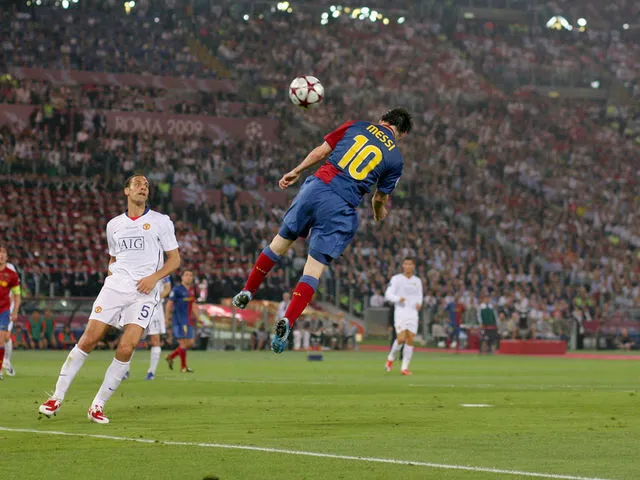
Messi won the 2009 Ballon d’Or by an even greater margin of votes than Ronaldo had done the year before. Real Madrid, the biggest club in the world and the self-described “Kings of Europe,” now firmly out of their galactico era in the looming shadow of their Catalan rivals, had to act. In the summer of 2009, in what is widely considered the greatest transfer window for any club in football history, Los Blancos pulled out all the stops. They signed a young Karim Benzema from his boyhood club Lyon, Kaká, still considered one of the world’s best players at the time, from AC Milan, Spaniards Xabi Alonso and Raúl Albiol from Liverpool, and most importantly, the then-still-reigning best player in the world, Cristiano Ronaldo, for a world record transfer fee of €94 million.
This paved the way for the hotly debated rivalry that we have today. Ronaldo and Messi, both in their primes, spent the next nine seasons playing in La Liga at the height of the golden era of Spanish football, as the preeminent players of the two most famous football clubs in the world, competing in the biggest rivalry in club football, scoring goals and delivering iconic moments for fun. Barcelona’s dominance continued from 2009 through 2012. Pep Guardiola, whose two other managerial stints at Bayern Munich and Manchester City have also been marked by dominance and the relentless pursuit of his idea of footballing perfection, set a bar that he may never exceed or even live up to again. In four seasons, his Barcelona side won the Champions League and Copa del Rey twice and La Liga three times. Messi won the Ballon d’Or after each of these seasons.
It was only through Real Madrid’s success and Ronaldo’s heroics in the Champions League that the Portuguese superstar managed to make his case as the greatest of all time. The Champions League is the most coveted prize in club football for good reason, and Real Madrid, the club that have won it most by a considerable margin, are still perhaps the club that place the most emphasis on winning it. By the time that they won it in 2014, Ronaldo’s first since 2008 and first at Real Madrid, the wait for La Décima was 12 years in the making. Ronaldo became the highest-scoring player in the competition’s history, scored some of its greatest ever goals, and won the competition three more times in a row between 2016 and 2018, before moving on to a new challenge in Italy at Juventus.
2016 was undoubtedly the greatest year of Cristiano Ronaldo’s career. Coming off a third career Champions League winner’s medal with Real Madrid, Cristiano Ronaldo captained Portugal in Euro 2016, the seventh major international tournament of his career. Up to this point, neither Messi, nor Ronaldo, had won a major honour with Argentina or Portugal. Portugal, dwarfed by larger UEFA federations like Spain, Germany, Italy, France, and England, had little chance or opportunity of seriously contending for the World Cup or the Euros, each of which only came around every four years. Argentina, on the other hand, had established the precedent of World Cup glory and played in a smaller confederation with fewer nations that could be considered legitimate challengers. Thus, the expectation for Messi to deliver an international trophy was far greater than it was for Ronaldo. The Euros, however, did not always play out the way that World Cups did. World Cups were almost only ever won by nations counted among the favourites, with the strongest squads in the tournament. The Portuguese needed no reminding that the Euros, on the other hand, could deliver a Cinderella story; they had been defeated in the final of the 2004 edition on home soil against Greece. Portugal played a scrappy, unconvincing tournament. They drew every game in a group featuring footballing minnows Iceland, Austria, and Hungary. They relied on extra time to beat Croatia in the round of 16, penalties to beat Poland in the quarter finals, and won their first game of the tournament in regulation time when they beat Gareth Bale’s spirited Wales side 2–0 in the semi-final.
They were met in the final by hosts and favourites France, playing on home soil in front of over 75,000 at the Stade de France. Ronaldo, who had dragged his country this far, was injured midway through the first half and could not continue. With 70 minutes in the game to play, and Portugal having just lost its only real difference maker, a Parisian parade the following day seemed certain. Somehow, the Portuguese held on through regulation time once again, and in the 109th minute, out of nothing, Portuguese substitute Eder struggled to get the ball out of his feet and drove a low strike across his body into the far bottom corner of the French goal, catching Hugo Lloris completely off-guard.
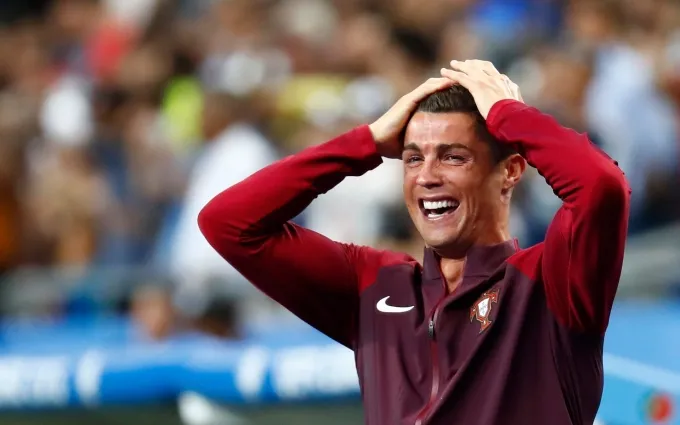
Cristiano Ronaldo had definitively outdone Lionel Messi. Despite fewer opportunities to do so and a significantly smaller chance of accomplishing it, Ronaldo had won a major international trophy for his country, the first in its history no less. The player, proven to be the best in the world while playing in each of the two best leagues in the world, had delivered for his country as well. Meanwhile, Messi, a Barcelona academy graduate and lifelong system player, protected by a footballing philosophy tailored to his talents, tactics built around him, and in the league most conducive with his level of physicality, had never won anything with Argentina. That same summer, in the centennial edition of Copa America, Messi lost his third international final in three consecutive years, missing his penalty in the shootout against Andean rivals Chile. After the game, the disconsolate Messi announced his retirement from the national team, citing that it clearly wasn’t for him and implying that he was an impediment to Argentina’s success. It was a stark juxtaposition that threatened to condemn Messi permanently to the status of second-best player of his era and the second-best player in his country’s history. Millions of Argentinians, appalled at the notion of losing the best player in the world, appealed to Messi for him to stay, and he soon reversed his decision to retire.
In recent years, Messi’s relationship with international duty has changed substantially. He used to bear the crushing load of national expectations on his shoulders palpably, and frequently looked uncomfortable in the famous sky blue and white stripes. For at least the past two years, his demeanour is markedly lighter and more carefree. This could be due to a realization brought on by deep soul-searching, or could be because the national team became a respite from the dysfunction at Barcelona leading up to his departure, or his unhappiness in Paris. Either way, post-pandemic, Messi has most enjoyed his football when he laces up for his country. Messi comes as close to extroversion here as he does anywhere, telling jokes and anecdotes over mate or a game of cards. This has worked miracles, and the Argentinian camp has radiated chemistry and camaraderie. Lionel Scaloni has built a balanced squad of old and young, with all players happily accepting that they are playing for and in service of Lionel Messi.
Through this, they were able to win Copa America in the Maracaná in the summer of 2021. Messi, finally, had the coveted international trophy that he had been yearning for, himself calling it, “the title I had been missing.” Though it was obvious that he, like any other footballer, still dreamt of winning the World Cup, it seemed as though he could now retire, content that his international career had been a success. By winning the premier South American international continental trophy, the argument that he had not matched Ronaldo’s accomplishments with Portugal was now void, although Ronaldo’s Euro conquest was arguably more impressive. Principally for his efforts in Brazil, Messi was awarded with the 2021 Ballon d’Or, taking his total to seven compared to Ronaldo’s five.
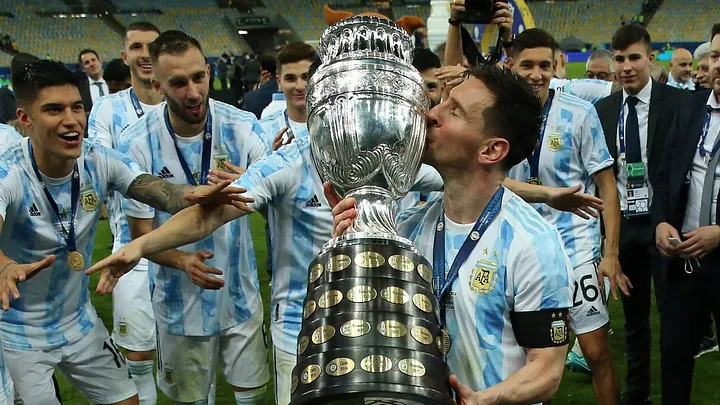
The back half of the 2021–2022 season was disappointing for both players. For Messi, the disappointment was personal. Playing alongside Neymar and Mbappé as more of a playmaker, his goal involvement output was the worst it had been in over a decade; it was clear that he had not adjusted to PSG and French football. Ronaldo, meanwhile, had a dismal first campaign back at Manchester United, winning no trophies and finishing 6th in the Premier League despite a decent personal season. Mr. Champions League, if he stayed at Manchester United, would not play in the competition for the first time since 2003.
The anticipation for this season was special, as no one knew what to expect from a season interrupted by a winter World Cup. Players knew that they would have to feature often and play at a high level from the onset of the season to have the strongest chances of being selected for their respective World Cup squads in early November. Manchester United had appointed Erik ten Hag from Ajax as their new manager, and early warning signs and friction with Cristiano Ronaldo in preseason suggested that he did not rate the Portuguese superstar very highly. Ronaldo tried desperately to leave the club for somewhere where he could play Champions League football. Rumours swirled that his agent Jorge Mendes had offered him to virtually every team in the competition, and, inexplicably, that no team wanted him. Erik ten Hag assured the press that Cristiano was a part of his plans, and after crisis talks with Manchester United, Ronaldo stayed put. Once the season started, however, it was clear that ten Hag had no intentions of having Ronaldo play a meaningful part in the campaign. The superstar and legend of the game, who had still scored comfortably in double figures at the same club the previous season and been its best player, was confined to the bench, only starting in the Europa League against the likes of Omonoia from Cyprus and Sheriff Tiraspol, from Transnistria, a breakaway state from Moldova on the Ukrainian border. Shortly before the World Cup began, after his relationship with the manager and the club had deteriorated beyond repair, Ronaldo gave a scathing, unprecedented tell-all interview to Piers Morgan, where he criticized almost everything about his employers: the infrastructure, the ownership, the manager, his teammates, and even the fact that the cooks employed by the club were the same ones who had been there during his first spell over a decade ago. His contract was terminated days later by mutual agreement, and he entered the World Cup, his last opportunity to win football’s biggest prize, as a free agent.
His fortunes only worsened in Qatar. He was substituted by longtime Portugal manager Fernando Santos (with whom he won Euro 2016) in the 65th minute of their final group stage match against South Korea, a decision with which he was visibly frustrated. Annoyed, he ambled off the pitch, and told a South Korean player telling him to hurry to shut up. He failed to shake the manager’s hand, and continued his grumbling on the bench. Though Portugal advanced, Ronaldo, his country’s captain and national hero, was benched for their quarter final clash against Switzerland. While Santos had voiced his displeasure with Ronaldo’s behaviour after being substituted, it wasn’t clear whether the decision to bench him was primarily disciplinary or tactical. What made matters worse for Ronaldo personally was that the player who replaced him in the lineup, the relatively unknown commodity Gonçalo Ramos, scored a hat-trick as Portugal comfortably dispatched the Swiss 6–1. Though Ronaldo came on as a substitute, the game was already won by the time that he did, and he did not contribute in a meaningful way once he stepped onto the pitch.
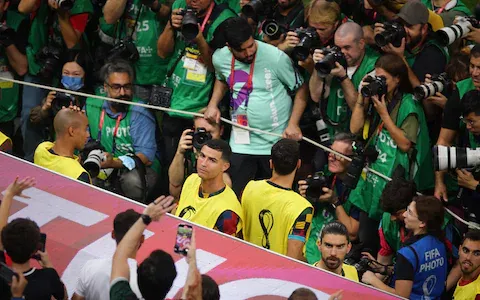
The next round demonstrated that the benching was no one-off punitive measure. When Portugal came up against giant killers Morocco in the quarter finals, who had already dispatched Belgium during the group stage and beaten Spain on penalties in the previous round, Ronaldo started the game on the bench again. This time, however, his understudy did not save the day, and Portugal went into the half-time break trailing 1–0. Ronaldo was brought on for midfielder Rúben Neves in the 51st minute to turn the game, but he had little to no impact on proceedings, and his side petered out of the competition at the hands of the Atlas Lions. The last image of Cristiano Ronaldo at a World Cup was of him, the captain of his country, inconsolable, leaving his teammates on the pitch and slinking back to the dressing room, unable to keep the tears at bay as he mourned the death of his biggest sporting dream. All this came only weeks after ruining his legacy at one of the two clubs where he was considered a legend. It was yet another valley in what had been a devastating year for him professionally as well as personally.
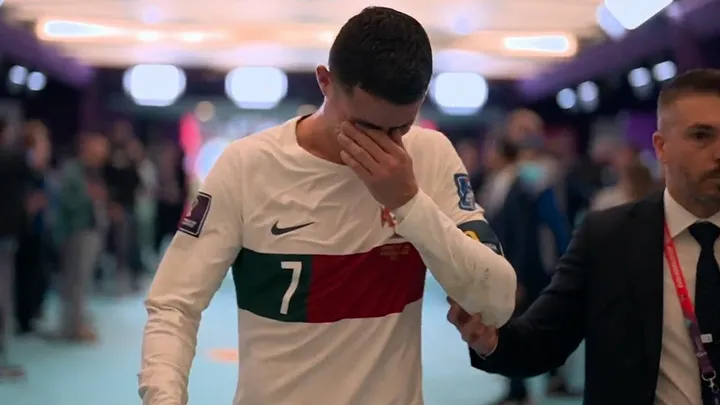
A mere eight days later, his eternal rival Lionel Messi, who had only changed the narrative about their respective international careers in 2021, would close out his World Cup story by parading the most important trophy of all around Lusail Stadium on the shoulders of his close friend Sergio Agüero, the spitting image of Maradona in the Estadio Azteca in 1986. In his last opportunity, in the most dramatic fashion imaginable, while playing a pivotal role in his team’s victory, Messi had closed the debate once and for all.
Diego eterno
The story of Messi and Maradona is so cosmic that it borders on scriptural. The two diminutive left-footed Argentines have plenty in common, but it is their differences that make their shared legacy so special.
Diego Armando Maradona was as Argentinian as the tango. A true porteño, he was born and raised in Greater Buenos Aires in the poor, southern outskirts of the city. No mere mortal, the man affectionately referred to by his countrymen as El Pibe de Oro — “The Golden Boy,” and D10S, in reference to his playing number, is heralded in his homeland as what the latter name suggests: a god. This blasphemy, no less, in a heavily Catholic country that produced the sitting pope. Maradona was a cultural icon, a folk hero. In many ways, he was the personification of stereotypical late-20th-century Latin American machismo. He was charismatic, outspoken, and frequently featured in tabloid magazines. His exploits, especially in Italy, were legendary, with stories told about him going on cocaine-fueled benders and rubbing shoulders with the mafiosi of the Neapolitan underworld.
He was also a hero of the working class. His transfer to Napoli in 1984, at the height of his powers, had huge political implications. Serie A, the strongest league in the world at the time, was dominated by teams from the north of Italy, like Juventus, Milan, and Inter. The whole city of Naples was looked down upon by the rest of the country, especially by northerners, as a dilapidated crime nest lacking even the most basic components of civilization. This disdain also had racial connotations, and falls within the long history of the cultural divide between north and south in Italy. So, when a short, stocky Argentinian of partial indigenous heritage from a poor family arrived at Napoli to upset the status quo, the ultras from northern clubs responded accordingly.
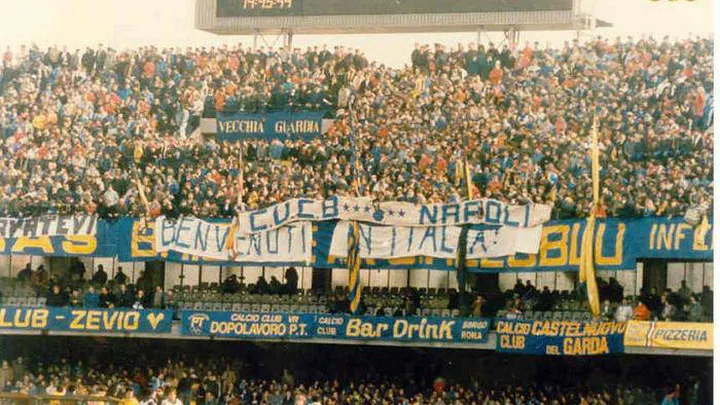
And upset the status quo he did. Maradona led Napoli to two Serie A titles in 1987 and 1990, with consecutive second-place league finishes in between. This practically canonized him, and his image can still be seen all around Naples, depicting him as a saint. His most captivating performances, however, came in the summer of 1986 in Mexico.
It was there, in his second World Cup, that Maradona put down the most dominant tournament display of any player in the competition’s history. He led Argentina to their second World Cup triumph with a 3–2 victory in the final over West Germany, but his true heroics came in the quarter-final clash against England. Set against the context of the Falklands War four years prior, an armed conflict between the UK and Argentina that resulted in a decisive British victory, its retention and continued administration of the Falkland Islands off the Atlantic coast of South America, and over 600 Argentine deaths, tensions between the two sides were rife. The two most iconic goals of Maradona’s football career both came in this game. The first, in the 51st minute, was the goal that came to be known as “The Hand of God.” Maradona beat English goalkeeper Peter Shilton to the ball, and while he appeared to head it, raised his fist just above his head and punched the ball over the goalkeeper and into the net. The goal was given, and has remained one of the most controversial goals of all time. It has been interpreted in a plethora of ways, perhaps most interestingly as a deft and intentional move of political revenge against the British for the war. Four minutes later, he scored “The Goal of the Century.” He picked the ball up in his own half, managed to turn while closely marked by two English defenders, and took off towards goal. He slalomed past five English players, went around Peter Shilton, and poked the ball into the net from the edge of the six-yard box.
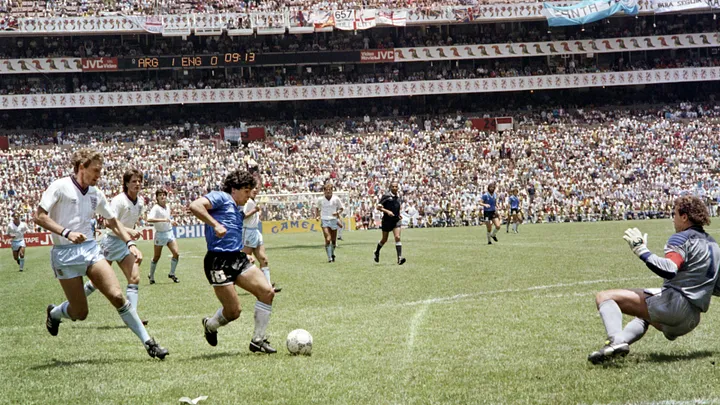
Messi, on the other hand, is far from the archetypical example of an Argentine man. He was born in Rosario, Argentina’s third-largest city, upstream along the Paraná River and far from the Río de la Plata and Buenos Aires. He was a shy, reserved boy, and has remained that way, even as an elite athlete and one of the most famous and recognizable men on the planet. His temperament is cool, and he is rarely animated, even on the pitch. He is married to his childhood sweetheart from Rosario, Antonela, with whom he shares three sons.
At the age of 13, Messi moved to Spain to join Barcelona. The Catalan club had offered to pay for his growth hormone treatment, and as the family could not afford to pay it themselves, when the interested clubs in Argentina refused to pay, a young Messi uprooted his life and made the move. His mother and siblings soon moved back to Rosario, and Messi struggled with homesickness. He eventually adapted once he was able to start playing regularly for the academy team, and debuted for the senior side a few years later. In order to bypass a La Liga restriction on foreign players that limited his playing time, Messi adopted Spanish citizenship and became a dual citizen. He was thus courted by the Royal Spanish FA to represent Spain at international level, but refused in favour of his native Argentina.
Despite living abroad from a young age, for a time that now constitutes the majority of his life, Messi maintains a strong connection with his homeland. Though he moved to Spain as a child, he has not only retained an Argentine accent, but one that is still distinctly Rosarino. He still addresses people, whether in Argentina or Spain or elsewhere in the Spanish-speaking world and beyond, as vos, a phenomenon distinct to Argentina and Uruguay, instead of with the alternatives tú and usted that he would have been repeatedly exposed to in Spain. One of the objects he is most frequently seen with is his custom mate gourd, inscribed with the names of his wife and children. His patriotism and affinity for his country and its culture are obvious, which only made his failure to deliver for Argentina on the biggest stage for so long more tragic.
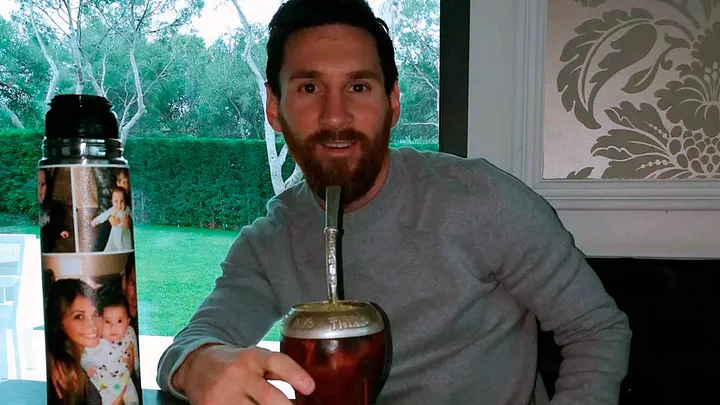
Messi was born in 1987, a year after Maradona’s Mexican masterpiece. He grew up in a world in which his predecessor had already captured the imaginations of a football-mad country, and only further entrenched himself in their national collective consciousness. It is often said that a footballer’s prime is when he is 27 years old. Diego Maradona is 27 years older than Messi. They are separated by exactly one generation of footballing greatness. Maradona, himself the captain of his country in the World Cups of 1986, 1990, and 1994, also had to contend with the massive pressure to bring glory to a country that had already tasted it and so desired to taste it again. He, however, did not have the Herculean task of following a titan, a godlike figure that transcended mortality. His World Cup triumph in 1986 came a mere eight years after the team of Mario Kempes won in 1978, and successive victories in 1990 and 1994 would only have enhanced an already secured legacy. Contrastingly, Messi was the tragic foil. He was the object of prophecy, a reincarnation of Maradona who moved, glided, the same way on the pitch; the man whose very name reflected his status as the messiah whose destiny it was to take Argentina to the top of the mountain again after so long.
Messi, who, as a 19-year-old, had almost perfectly recreated Maradona’s “Goal of the Century” against Getafe in the Copa del Rey, was in danger of delivering nothing to his country in a career that was otherwise full of highlights and trophies. The boy who had left home for Spain would be remembered in Argentina as a disappointment who only performed for a far-off club in Europe, the place he really called home. Despite being the better and more prolific player over a longer period of time, he would never eclipse the magic Diego produced, the feeling he gave to people, and the adoration he received from his compatriots.
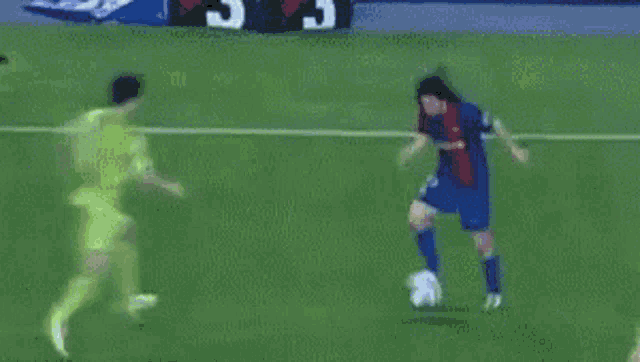
That was the state of things when Diego Maradona died in late 2020. The football world had lost one of its brightest ever stars, and, with Pelé still alive, it was the first time in living memory that an ex-player considered by many to be the best ever had passed away. Naturally, Messi was one of the people to whom the world first looked for answers. Whether he liked it or not, he and Diego were linked. Beyond Maradona’s stint as the manager of Argentina from 2008 to 2010, he and Messi did not cross paths often and did not have a close personal relationship. Despite this, they understood, as the world did, that they are indelibly connected in a way that no two other players of different generations from the same country have ever been or may ever be. Messi scored in his next match for Barcelona, and revealed his tribute to Diego: a vintage number 10 Newell’s Old Boys jersey, his own boyhood club, from the brief period that Maradona played there.
Whether coincidental or not, Diego’s death marked a change in fortune for Messi with La Selección. He altered his approach to international duty, playing more freely and unburdened by the shackles of pressure and expectation, and a rejuvenated Argentinian side was able to triumph in the 2021 edition of the Copa America, giving Messi his first major title with the senior national team. This feat, while impressive, did not compare to Maradona’s accomplishments in Mexico all those years ago. However, it seemed a fitting prize for a player who had toiled for so long to bring important silverware back for his country, even if it was to be only a consolation as the biggest prize of all still eluded him.
Prophecy and destiny
That brings us to Qatar. Argentina were by no means underdogs coming into the 2022 World Cup. They counted among the betting favourites; only Brazil and France had better odds to win the competition. Argentina looked confident and indomitable as they started their campaign on a 36-match unbeaten streak. This streak was promptly snapped in a manner that no one foresaw. Saudi Arabia, who only outranked hosts Qatar coming into the competition, took the game to the South American giants and beat them 2-1. The Argentinian public were shell shocked, their high hopes and aspirations ready to go up in smoke. Messi assumed responsibility and appealed to his nation, asking them to continue to support the team and rally behind them; that they would not disappoint. And he was right. La Albiceleste marched on to win their group, dispatching Mexico and Poland 2–0 apiece. They wavered slightly in the Round of 16, only managing to beat Australia by a one-goal margin.
Their quarter final clash against the Netherlands was their first true test, and the match where Messi completed his transformation into the hero his country needed. In a game not dissimilar to the final in terms of its momentum swing, Argentina went up 2–0, only to have their lead first cut in half in the 83rd minute, and then erased entirely in the 90th + 11 with what was literally the last kick of the game. It was a grudge match: players clashed, traded insults, and crudely gesticulated to opposition players, the bench, and even the fans. Even Messi, who throughout his career had usually avoided conflict on the pitch, celebrated his goal with a dig at the exceedingly loose-lipped Dutch manager Louis van Gaal by emulating Argentinian legend Riquelme, who had been benched by van Gaal at Barcelona two decades earlier. After a razor-thin Argentinian victory on penalties, the animosity continued in the tunnel and press room. Messi was accosted by Dutch player Wout Weghorst while giving an interview to an Argentinian journalist, and dismissed him in hilarious fashion:
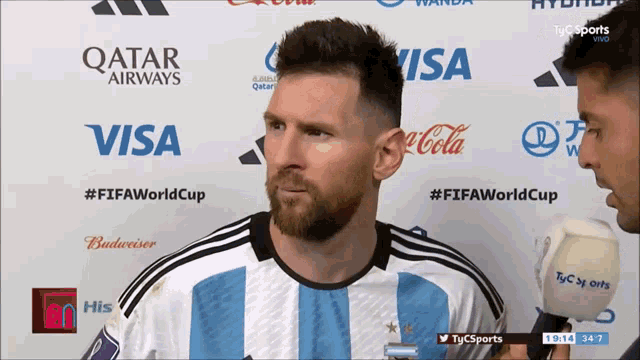
Though the move was criticized by many as unsportsmanlike, it was clear that this departure from his usual self was the result of sheer motivation and singular dedication to his goal of winning the World Cup. In the next round, an imperious Argentinian side comfortably dispatched Croatia 3–0 and advanced to the final, thus preventing a 2018 final rematch.
At some point after Montiel’s penalty bulged the net, before the trophy ceremony, I was overcome by feelings of gratitude. Billions of us bore witness to a sporting moment of a similar magnitude as the Rumble in the Jungle or Michael Jordan’s final shot as a Chicago Bull, the first of this scale that I had watched live. More importantly, however, I had the privilege of watching a man finally become that which he was promised to be. Lionel Messi, who was already cemented in my mind as the greatest footballer of my lifetime, fulfilled his destiny in front of my very eyes. I watched him, in the most extraordinary fashion possible, not even imaginable, as it defied imagination, reach the top of the mountain. In his fifth and final World Cup, certainly his last as one of the world’s best footballers, he rose to the occasion and played his best football in over a year when he most needed to. This, more so than anything else that I have ever witnessed before or am likely to ever witness again, is the best testament for why sports tell the greatest stories and teach the truest life lessons.
